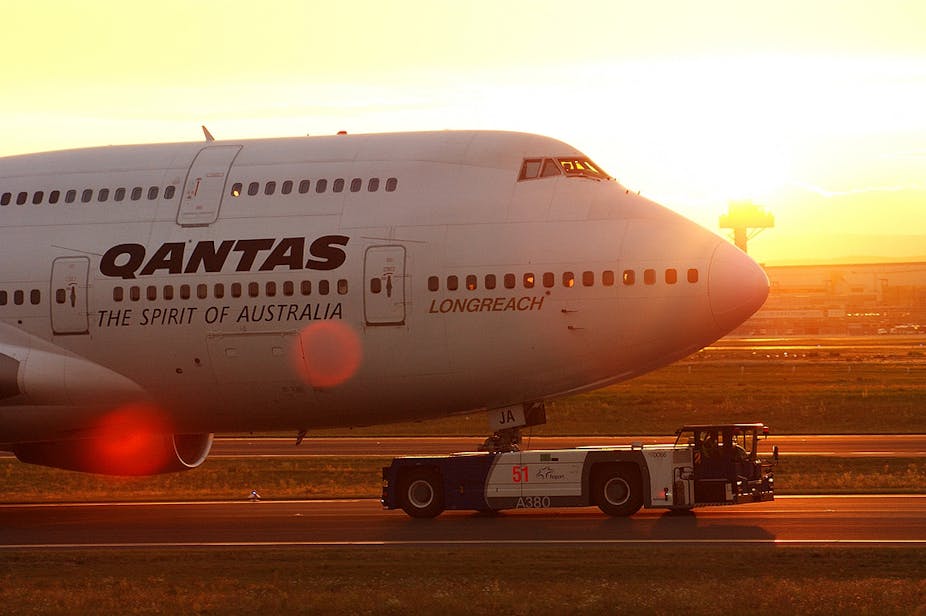Imagine that Virgin Australia was majority owned by a Chinese state-owned enterprise (SOE). Then, if the owners of Virgin tipped A$350 million of new equity into the company to sustain Virgin through a war over market share. How would the federal government react to that? Not very favourably I think.
We don’t need to imagine this scenario - Virgin is a state-owned enterprise. About 75% of Virgin shares are owned, in aggregate, by Air New Zealand, which is 53% owned by the NZ Government; Singapore Airlines, which is 54% owned by the Singaporean Government through its Temasek Holdings investment vehicle; and Etihad Airways, which is entirely owned by the government of the UAE.
Virgin could be owned by any of the world’s millions of global investors. Why is Virgin owned by three “flag carrier” airlines of three foreign governments? In part because those airlines will be the beneficiaries of a weakened Qantas shrinking its unprofitable international business. They will fill some of the void of Qantas shutting down international flights out of Australia.
Qantas announced last week it would no longer fly from Perth to Singapore – a case in point. It is also true that because of their government backing these airlines have deep enough pockets to finance Virgin through a long capacity war with Qantas.
Why does the Australian government tolerate this situation? Isn’t there a role for diplomacy here? We might expect the Australian government to quietly tell the governments of NZ, Singapore and the UAE that Australia is not happy with their government owned airlines waging this war with publicly owned Qantas, in Australia.
If Virgin were majority publicly owned, then that would be another thing – the matter should be resolved through competition in the airline markets and governments should not be involved. But Virgin is not publicly owned.
An alternative, or perhaps supplement, to quiet diplomacy would be a guarantee of Qantas’s bank and corporate bond debt by the federal government. Unfortunately, the federal cabinet has now ruled out a debt guarantee.
Qantas desperately wants this guarantee for two reasons. First, a debt guarantee makes Qantas’s commitment to defend its 65% market share more credible.
Winning a game of chicken
The lose-lose battle for market share that Qantas and Virgin are locked in is all about credibility. If both parties act rationally, then whichever party can demonstrate the most commitment to staying the course will win. In a game of chicken, in which two cars are speeding toward each other, whichever party can commit to not swerving (by throwing the steering wheel out the window) will win.
Virgin’s credibility comes from its demonstrated ability to raise hundreds of millions of dollars of new equity from its government backers. But a debt guarantee for Qantas would trump that. It would allow Qantas to raise billions of dollars of relatively cheap debt capital. It would force Virgin, if Virgin’s board is acting rationally, to back away from the battle for more market share.
The second reason that Qantas wants the debt guarantee is to do with its frequent flyer points business. The loyalty business, which is mostly about selling frequent flyer points, generated about A$1.2 billion in revenue for Qantas in the year to June 2013.
In the last six months, unlike the domestic or international businesses, the loyalty business made a considerable profit. In many ways that is money for jam for Qantas. Many of the points sold by Qantas and then attached to other products such as credit cards are never used. Even when they are redeemed, it is by putting passengers in seats that would otherwise be empty.
The fear that Qantas will slip into bankruptcy, just as Ansett Airlines did in March 2002, eats away at the perceived value of Qantas points and hence how much they can be sold for.
When Ansett went bankrupt its frequent flyer points holders became unsecured creditors of the firm and received nothing for their points. A debt guarantee would assuage the fear that Qantas frequent flyer points will become worthless and hence underwrite a valuable part of Qantas.
The case for a guarantee with conditions
The federal government wants Qantas to work its way through its problems, without resorting to government guarantees. The government does not want to create the precedent of providing a debt guarantee even if the good health of the firm or industry in question is manifestly in the public interest. But that precedent already exists. The deposits of banks are guaranteed.
Treasurer Joe Hockey has said a guarantee could amount to an unsecured loan of up to A$7 billion, but the government would not have to guarantee all of Qantas’s debt.
The guarantee could be linked to measured improvement in Qantas’s efficiency and also the amount of new equity capital provided to Virgin by its foreign government owners.
The survival of Qantas as a large, efficient, full service, domestic carrier is very much in the nation’s interest. The best way to guarantee the survival of Qantas is for Alan Joyce to radically improve the efficiency of the airline and for the federal government to guarantee Qantas debt.
There are no easy choices for the federal government in terms of providing support for Qantas. A debt guarantee was the cleanest and most easily justified way of providing that support.
If Virgin continues to press Qantas in the market share war, with the support of its three national backers, then the federal government may find it has painted itself into a corner.

